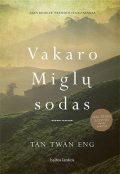 Original language:
English
Original language:
English Translated from: English
Authors: Tan, Twan Eng
Translated by: Raudonikienė, Eglė
ISBN: 9786094791130
Published in: Vilnius
Published on: 2018
Publisher: Baltos lankos
The protagonist of the novel, Yun Ling Teoh, is a Chinese lawyer who studied in the West and was one of the first women to work at Malaysia’s Supreme Court. Due to progressing senile dementia, she decides to end her career and return to a tea plantation surrounded by the jungle. While reminiscing, she goes back to the years of World War II, where she experienced the greatest horror of her life, and tells her story about an extraordinary experience while learning the art of Japanese gardening. The narrative of the book consists of three time slots. Present time, that is the in the late 1980s, when Yun Ling writes down her memories as her illness worsens to preserve them. The second period of time is after the Second World War, when she, as a young prosecutor, enraged that the British Malay leaders did little to help the victims of war crimes in Japan, comes to the mountains to learn the art of gardening. And finally, she opens up about the third, most painful part of life, telling what exactly happened to her and her sister in the prison camp.
She cannot forget the memories and nightmares of surviving in a Japanese prison camp during World War II. Even decades after the horror she experienced, Yun Ling feels an enormous amount of hatred for the Japanese over what happened to her and her sister. She is the only one who has survived in this camp, but has lost her youth, innocence, sister and two fingers.
But paradoxically, at the same time, she believes the sister’s memory will only be meaningful with the creation of a traditional Japanese garden, as her sister admired it immensely while being alive, and both sisters dreamed of creating their own Japanese garden to escape the brutal reality of captivity. That is why she is comes looking for Yugiri, the only Japanese garden in Malaya, and the mysterious Nakamura Aritomo, the former gardener of the Emperor of Japan, who owns this garden.
At first, the master categorically refuses to create a garden in memory of Yun Ling’s sister, but agrees to teach her the secrets of gardening until the raining season, so that later she can create a Japanese garden herself. Over time, Yun Ling’s hatred of the Japanese is replaced by admiration for the teacher and their relationship deepens and grows into love, which helps the heroine heal emotional wounds. They are both lonely and mysterious, but little by little their similarities can be seen and their reluctance to open up to others can be understood. While Yun Ling values Aritomo’s colorful, wholesome personality, the essential secret of this man’s past remains unknown to her.
“The Garden of the Evening Mist” is a tragically fascinating balance of memory and oblivion between different time periods, using the mystical elements of Japanese culture and revealing the dual nature of not only man but also the world. Japan’s brutal war history intertwines here with masterpieces of the country’s art and culture, as do the book’s main characters, who hate and love each other at the same time.
The author of the book, Tan Twan Eng, currently living in Malaysia, has acquired a law degree in London and worked as a lawyer in Kuala Lumpur for some time. Before turning to literature, he reached the first dan of aikido, so it is understandable why he could choose the profession of a lawyer to be the one of the his heroine, and also why Japanese culture, which he studied in detail trying to understand the subtleties of aikido, is one of the novel’s main highlights. In 2012, “The Garden of Evening Mists was shortlisted for the Man Booker Prize, won the Man Asian Prize, the Walter Scott Prize in the Historical Fiction category and has been published in over 20 countries.
